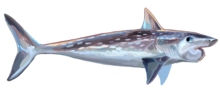Helicoprionidae (sometimes referred to as Agassizodontidae)[2] is an extinct family of holocephalans within the order Eugeneodontida. Members of the Helicoprionidae possessed a "whorl" of tooth crowns connected by a single root along the midline of the lower jaw.[2][3] While historically considered elasmobranchs related sharks and rays,[2] the closest living relatives of the Helicoprionidae and all other eugeneodonts are now thought to be the ratfishes.[4] The anatomy of the tooth-whorls vary between taxa, with some possessing highly specialized, coiling spirals (such as those of the namesake genus Helicoprion), while others such as Sarcoprion and Parahelicoprion possessed shorter whorls.[2]
| Helicoprionidae Temporal range: Early Carboniferous to Late Permian
| |
|---|---|

| |
| Helicoprion | |
| Scientific classification | |
| Domain: | Eukaryota |
| Kingdom: | Animalia |
| Phylum: | Chordata |
| Class: | Chondrichthyes |
| Subclass: | Holocephali |
| Order: | †Eugeneodontida |
| Clade: | †Edestoidea |
| Family: | †Helicoprionidae Karpinsky, 1911 |
| Type genus | |
| Helicoprion Karpinsky, 1899[1]
| |
| Type species | |
| Helicoprion bessonowi Karpinsky, 1899
| |
| Genera | |
| Synonyms | |
| |
References
edit- ^ a b Lebedev, O. A. (2009). "A new specimen of Helicoprion Karpinsky, 1899 from Kazakhstanian Cisurals and a new reconstruction of its tooth whorl position and function". Acta Zoologica. 90: 171–182. doi:10.1111/j.1463-6395.2008.00353.x.
- ^ a b c d Zangerl, Rainer (1981). Chondrichthyes 1: Paleozoic Elasmobranchii (Handbook of Paleoichthyology). Friedrich Pfiell. pp. 74–94. ISBN 978-3899370454.
- ^ Cicimurri, D. J.; Fahrenbach, M. D. (2002). "Chondrichthyes from the upper part of the Minnelusa Formation (Middle Pennsylvanian: Desmoinesian), Meade County, South Dakota" (PDF). Proceedings of the South Dakota Academy of Science. 81: 81–92.
- ^ Nelson, Joseph S.; Grande, Terry; Wilson, Mark V. H.; Wilson, Mark V. (2016). Fishes of the world (5th ed.). Hoboken, New Jersey: John Wiley & Sons. pp. 48–50. ISBN 978-1-118-34233-6.
External links
edit- Palaeos Vertebrates 70.100 Chondrichthyes: Eugnathostomata at paleos.com
- JSTOR: Journal of PaleontologyVol. 70, No. 1 (Jan., 1996), pp. 162-165
- More about Chondrichthyes Archived 2017-10-22 at the Wayback Machine at Devonian Times